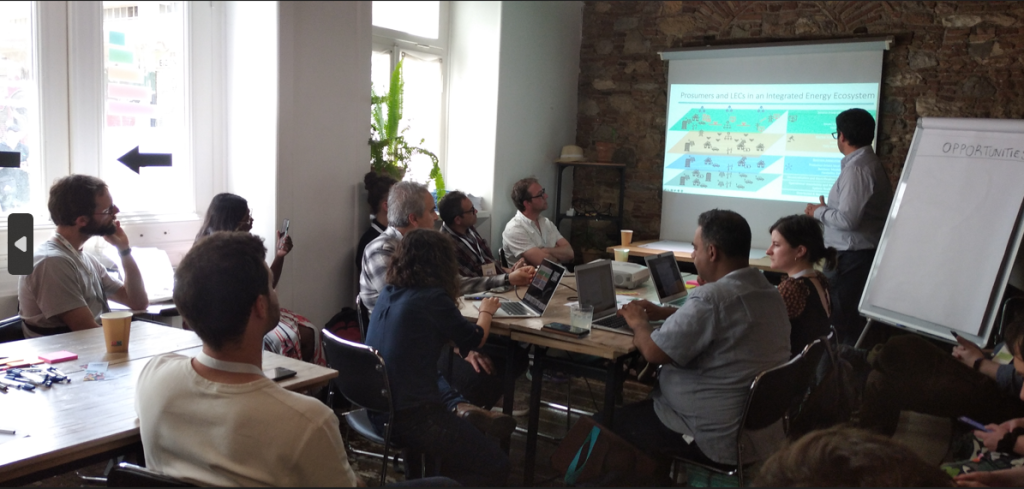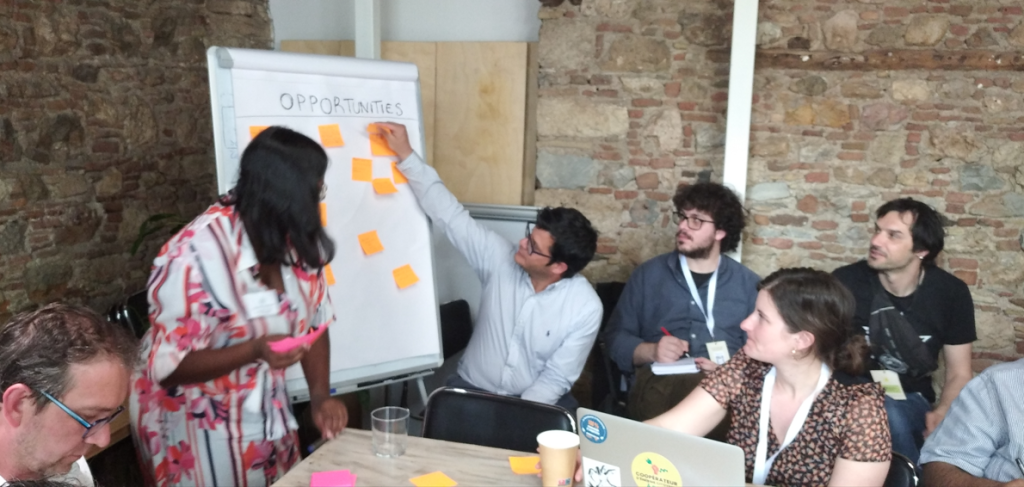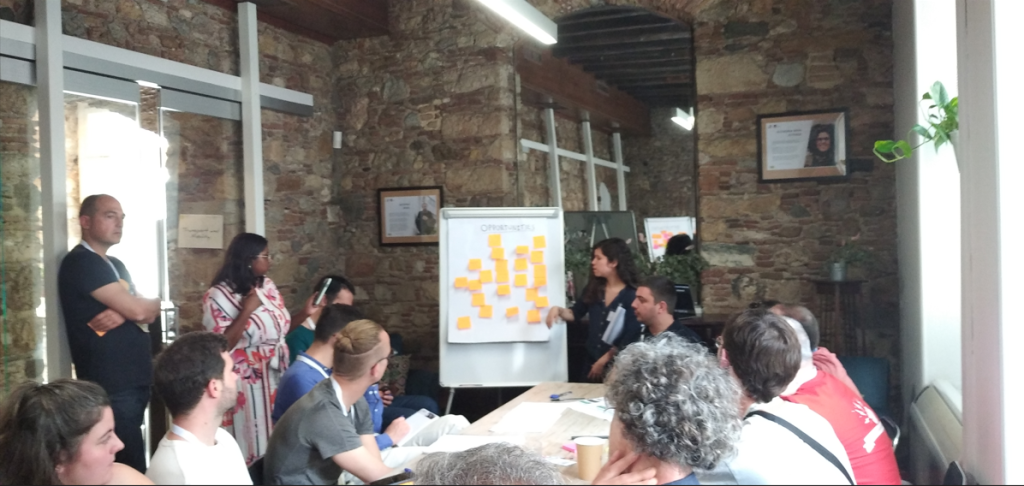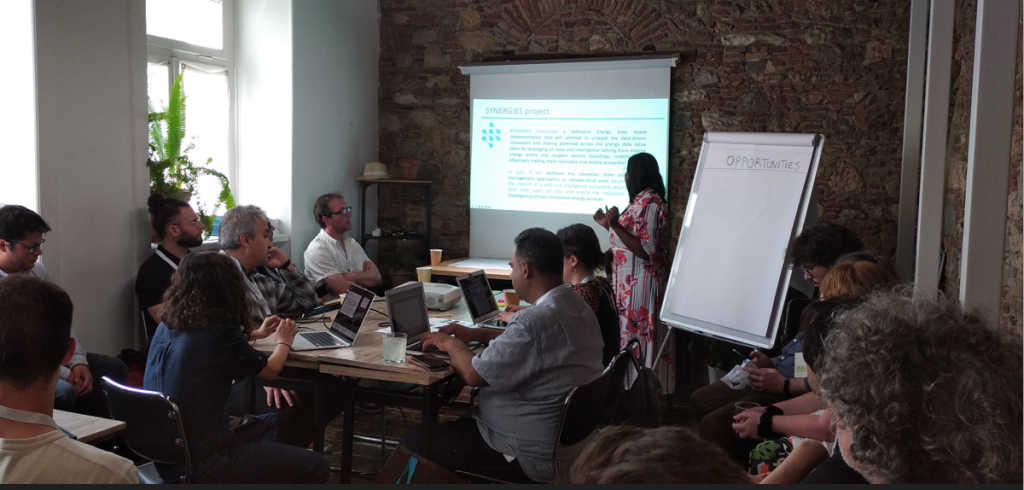The engagement of prosumers and stakeholders of the energy value chain is key to the development and validation and of SYNERGIES solutions and results. For this purpose, SYNERGIES aims to organise a series of collaborative, co-creation and innovation workshops called Living Labs. These workshops will involve both prosumers and key stakeholders in the energy data value chain, resulting respectively in B2C and B2B Living Lab workshops .
The first B2C workshop took place on the 8th of May 2023 in Athens, Greece. It employed participatory techniques and interactive exercises in order to engage the participants in a more efficient way, creating a a stimulating and serious game-like environment. It was organised by the consortium partners experts of PI and CoEn and it involved 20 participants.
The objectives of the workshop were:
- To discuss benefits of common energy data spaces for local energy communities;
- To understand the barriers that energy communities are facing in the development of common energy data spaces;
- To come up with solutions to overcome the barriers identified by the energy communities;
- To get insights on the priorities according to the local energy communities in order to successfully implement common energy data spaces.
For this purpose, 3 interactive activities were organized.
First Interactive activity – opportunities
For the first activity, the participants were asked to brainstorm on the advantages for energy communities of the implementation of common energy data spaces.
More generally efficient energy systems/ opportunities for the local energy communities as a whole:
- The creation of a more efficient energy system for heating, gas and electricity
- Optimization of the local community energy performance and the community collective
- The potential to save energy by collective action
- Greater public awareness of energy usage
- Better advocacy for the government with a shared platform/digital twin
- Better protection from surveillance and big tech companies
Opportunities for better design of energy community projects
- Reduction in energy losses by better monitoring
- Being able to identify bottlenecks and allows to be proactive on how to solve them
- Creating anticipation for more sustainable scenarios, leading to greater participation in local energy action
Benefits for individual prosumers:
- Empower prosumers with data (free access)
- Better control and optimisation of the energy consumption by prosumers, balancing production and consumption, also through the integration with domestic devices
- Better prediction of energy costs for prosumers
- Improve on transparency and accounting for prosumers concerning their energy costs
- Better representation of prosumer data
- Prosumers get sovereignty over their energy data
- Cheaper energy supplies, less spending on network costs.
- Access to new services and flexible trading of energy between prosumers, with possibility for prosumers to sell their overflow energy locally
- Educational benefits for the prosumers
Business opportunities:
- The creation of new revenue models
- The integration with more energy system actors
- The emergence of new business models to sell data
- The possibility to develop open source solutions for communities
- More profits for energy communities
- The possibility to integrate novel technologies
- The possibility to create better capacity agreements
- The possibility to create flexible services, based on the energy data that is gathered
- No involvement of data sellers/ increased transparency on energy data
Systemic improvements:
- The optimization of storage systems
- Reducing the peak load for the entire country
- Decentralization of data
- Opportunities to streamline administration surrounding energy systems
- Reduced local energy costs
- More effective demand management
Second Interactive activity – barriers
The second activity focused on the question “which barriers do you see to the development of common energy data spaces in your local energy community?”. The participants identified several obstacles, among which:
On the energy data and IT/software aspect of common energy data spaces:
- GDPR issues
- Data security – the potential to be hacked
- The obscure way of presenting energy data, making interpretation challenging
- The scarcity of the data sets
- The software and surrounding business model will be in private hands (big tech)
- A shared database controlled by state-dependent data gathering organizations
- IT services are expensive
Some doubts emerged also concerning the implementation of common energy data spaces:
- The deployment of the smart metering system is not yet advanced enough
- Costs for implementation would overrule cost savings on energy
- It takes too much time to launch such an initiative
- Data storage takes a lot of energy consumption
- UBERisation of the energy market: the benefits are only for a selected few
- Access for small corporations is limited
- Will the common energy data spaces make the energy market more democratic? What about the social impact?
- There is no clear framework yet, it is too complex still
- The digitalisation of critical services is dangerous (what if it crashes?)
- The scope of the idea is too big, it should be narrowed down
- Vulnerable to cyber attacks
Obstacles for the involvement of prosumers in common energy data spaces:
- Accessibility gaps: not everyone has smart home appliances or a smart meter
- Consumers become passive end-users again if not approached in the right way
- Creating energy inequality
- Lack of community participation – discouraging to prosumers who are already sceptical/unaware of energy communities
- The social impact is not considered; there is no focus on soft data
- There is a lack of existing competencies with prosumers
- There is a lack of prosumer confidence
- Energy communities don’t know how to use this amount of data
- Trust issue: who has access to the data?
- The prosumer becomes a product: their data is the commodity to be sold
Moreover, legal shortcomings were identified in the framework surrounding the development and implementation of common energy data spaces:
- The absence of a legal framework
- Unclear legislation surrounding energy data spaces and energy data sharing
- Laws are very much centralized on energy producers
- There are only a few bylaws on implementation
- Existing frameworks and standards have to be adjusted
- Doubts about data privacy (e.g. who owns the data?)
- Lack of an open platform
- Lobbying from big tech will not be in line with the influence the energy communities can gather to further its interests
- Who owns the business models and software?
Third interactive activity – solutions
Finally, in the third interactive activity, participants were asked to identify solution to these barriers. Several solutions came up:
On the topic of data transparency in the common energy data spaces:
- Go for privacy by design: encryption and decentralization of data
- Have transparency on the cost of the energy that is generated and used by the prosumers
- Build a strict framework in terms of data security that respects the prosumers position
- Have transparency around the environmental benefits of the common energy data spaces
Solutions identified to solve the systemic issues that would hinder the proper development and implementation of common energy dataspaces:
- Start with implementing one service and implement the rest step-by-step to have a better appropriation by the prosumers
- Include trusted standardization organizations in the development of the platform
- Have a secure design/make the system robust – Monitoring and verification during the entire development phase of the platform
- Simplified lifecycle assessment for IT requirements
- Systemic documentation of the effects on the grid
- Open standards
- AI automation that leads to reduced energy consumption
- Make the energy data spaces compatible for electronic vehicles
- Ensure decarbonising of the network
On engaging prosumers to adopt the common energy data spaces:
- Organize workshops for collective data gathering and sharing
- Focus on community-based technology development
- Ensure that all prosumers are beneficiaries of this innovation, not only those who are tech-savvy
- Provide free software for prosumers to use
- Co-design with the prosumers to make data collection as transparent as possible
- Don’t make it boring for prosumers
- Minimize data collection
- Ensure prosumers can see the advantage of common energy data spaces
- Minimise the hassle for prosumers to enter into these common energy data spaces
- Provide free services to impacted communities or energy poor citizens
- Create an open data platform that is energy cooperative-owned and developed
- Encourage multi-sector cooperation for early adoption and good democratic representation
- Build open source communities to empower citizens
- Get everyone around the table on energy system governance: DSOs, TSOs, energy communities, governments, prosumers etc. to get to a more inclusive energy system
- Have effective knowledge exchange between involved actors in different countries
- Build open source communities to empower citizens
- Don’t forget about the most vulnerable individuals in society
Solutions focusing on the role of energy communities to establish successful common energy data spaces:
- Mutual and shared innovations for the energy communities
- Create a shared platform of all energy communities to cut the budget needs
- Create a business model inspired by energy cooperatives/energy communities
- Integrate solutions that reveal the potential of energy communities
- Crowd sourcing via energy communities for soft data
- Go beyond the story of the SYNERGIES project and share not only energy usage data but also look into the creation of a citizens initiatives map
- Choose a bottom-up approach to develop an open data/open source platform that is easy to use for energy cooperatives and energy communities
Solutions to the legal issues described earlier:
- Have new regulation pushed through the European Parliament/ European Commission to make these kinds of innovations successful
- Have the European Commission as a mandatory participant
- Have close collaboration between DSOs, TSOs and authorities
- Create decentralized data centres to store the prosumers’ energy data
- Push for data-handling agreements
- Have effective legal protections for prosumers



The workshop was part of a bigger event that was organized by REScoop, the European federation of citizen energy cooperatives. This event was the Community Energy Spring Gathering and SYNERGIES was invited through project partner Nasos Vasilakis from CoEn to attend and organize the workshop as a side-event. The workshop was given the title: “The benefits of energy data platforms for local energy communities”.
Watch the recap video of the event HERE!

